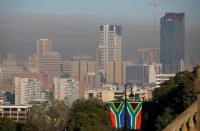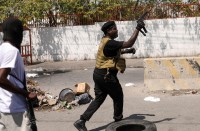
The 21-storey building was still under construction when it fell abruptly into a pile of concrete slabs on Monday in the wealthy Ikoyi district of Nigeria’s commercial capital. (Photo by Benson Ibeabuchi / AFP)
by Louise Dewast and Joel Olatunde Agoi
LAGOS, Nigeria (AFP) — Two more bodies were pulled out early Wednesday from the debris of a collapsed Lagos high-rise building, bringing the death toll to 22 people, the emergency services said.
The 21-storey building was still under construction when it crumbled on Monday in the upscale Ikoyi neighbourhood of Nigeria’s commercial capital.
Rescuers said Wednesday they had recovered 22 dead bodies so far and rescued nine people who survived, but construction workers feared dozens of their colleagues were trapped inside.
“We recovered two male bodies early this morning, bringing the toll to 22,” Ibrahim Farinloye of the National Emergency Management Agency told AFP.
The number of survivors still stood at nine, he said, adding that search and rescue operations were still on.
Hope of finding more survivors appeared to dim as the rescue operation entered the third day on Wednesday.
“We won’t give up until we reach ground zero,” Farinloye said, adding that bigger equipment was brought in Tuesday evening for the operation.
He had earlier said rescue workers had been communicating with other survivors still trapped under the destroyed building.
Distraught relatives and friends of the victims have been besieging the scene since Monday, seeking information on their fate.
Two other smaller buildings in Lagos also collapsed on Tuesday following heavy rains in the densely populated city a day earlier, though no one was killed, he said.
Building collapses are tragically common in Lagos and across Africa’s most populous nation where substandard materials, negligence and a lack of enforcement of construction standards are major problems.
‘Like his own daughter’
Lagos state police said it is too early to determine why the Ikoyi building collapsed, but Lagos emergency management agency manager Femi Oke-Osanyintolu said infractions had been committed in its construction.
“We are going to get to the roots of the matter to prevent a recurrence,” he told AFP.
About 20 onlookers, including family embers and friends of the victims were at the site Wednesay morning.
A friend of a victim who did not want to be identified “because it won’t change anything”, said that “what they are doing is a retrieval operation not a rescue operation”.
Damilola Otunla, 29, sat on the pavement across the street pursuing a three-day vigil for her brother Bob-Oseni Wale, 50, believed to have been inside the high-rise when it collapsed.
When she heard news of the disaster on Monday, she immediately rushed to the scene from her home in neighbouring Ogun state.
Wearing the same grey hoodie, black shorts and flip flops since Monday, Damilola looked sad, her eyes empty, as she recalled how her much older brother acted like a father.
“He took me like his own daughter,” she added.
She was angry with the slow pace of the daily rescue efforts, which had not started as of 8:30 am Wednesday.
“It is like they have made their decision already,” she said.
Other family members were also at the scene.
Bob-Oseni lives in the US state of Maryland but had been home for the past few months and was visting a friend working on the building site, his family said.
He was meant to fly back on Monday when the tragedy happened.
In one of Nigeria’s worst building disasters, more than 100 people, mostly South Africans, died when a church guesthouse crumbled in Lagos in 2014.
An inquiry found the building had been built illegally and had structural flaws.
Two years later, at least 60 people were killed when a roof fell in on a church in Uyo, the capital of Akwa Ibom state, in the east of the country.
© Agence France-Presse








